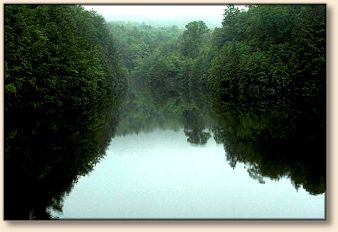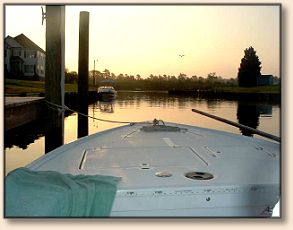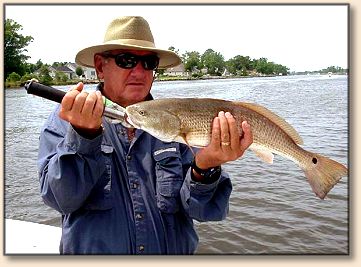There is so much water in Eastern North Carolina that
you could go to a different creek everyday and not visit
the same one for weeks on end. The history of the area
between Beaufort and Pamlico Sound is well documented in
a number of books. North Carolina's written history began
in the sixteenth century with the voyages of Sir Walter
Raleigh and the founding of the ill-fated Lost Colony on
Roanoke Island. But there is a deeper, unwritten past
that predates the state's recorded history. The region we
now know as North Carolina was settled more than 10,000
years ago, but because early inhabitants left no written
record, their story must be painstakingly reconstructed
from the fragmentary and fragile archaeological record
they left behind.
We know there were many battles fought especially during
the Civil War. On 7 March 1863 Confederate forces of the
43rd and 63rd North Carolina Calvary Regiments clashed with
Union Infantry near Core Creek, an area of pristine wilderness
and open areas steeped with wild plums. At that time there
was no direct passage to the Neuse River, except by going
around Core Sound and Cedar Island and then meeting the Neuse
River at the south end of Pamlico Sound...a treacherous trip.
Deep water access by canals would become important as New Bern
became a major trading port.
In 1891 the government acquired old Clubfoot Creek - Harlow
Creek Canal linking Newport with Pamlico Sound. Maintaining
a navigable canal was difficult and a new canal was built
paralleling it in 1910. The Adams Creek Canal was connected
to Core Creek and offered a much deeper and more manageable
access for commercial vessels drawing up to 10 feet. There
were other benefits for anglers. It now provided access for
many fish species to migrate, spawn and grow. Tides run
strong along the canal and fishing can be absolutely wonderful.

At the mouth of Core Creek, where it meets Adams Creek at
Marker 21, there are two flats on either side of the
inter-coastal waterway (ICW). On the right side heading towards
the Newport River there is a small cove that harbors puppy
drum in the tall grass. This is not an area to wade, unless
you like mud up to your hips. The mud flat is flushed with
bait fish from tidal action. The bite is usually from slack
high tide to the out running tide.
The other side is Bell's and Eastman Creek. Both creeks
consist of muddy, oyster bottom and you'll find puppy drum
and speckled trout there. Deep back into these creeks
you'll find a lot of bait fish meandering along the grass
line and many predator fish stalking them. If you go just
a little farther down Core Creek and then take a sharp right
into the top of the Newport River, you'll find Oyster Creek.
As the name implies, it is not an area for wade fishing.
The best way to fish these areas is to cast to the grass
line and use a steady stripping action. Best flies to use
are #2 green/white Clouser Minnow or a light colored shrimp
imitation.
Ask Lee Padgett. He'll tell you that this is the best area
to catch fish, especially puppy drum. The fish in this area
run about 23-24 inches. You will also catch bluefish, Spanish
mackerel, jack cravelle, speckled trout, flounder, croaker,
and even large mouth bass.
Lee, Heinz and I met at Seagate Marina in Havelock (west
side of Adams Creek Canal). Seagate has a great launch
ramp. The launch fee is $5.00 but well worth the expense.
You'll more than make up for that by the amount of fish
you will catch.

We headed down Adams Creek for the small mud flat on the
right side of Marker 21. We shut down and I pole us into
the flat. This area is secluded from the rush of boats
on the ICW. We saw pushes and bursts...tell tale signs
of puppy drum. But no one was feeding. Captain John was
with a fishing party on the opposite side, so we moved in
the opposite direction. After an hour and no hits, I poled
out to the ICW and we headed across to Bell's Creek.
Bell's Creek is as pretty as they come. The flat is about
three feet deep at low tide. You can use your trolling
motors to explore all of it. My favorite spot is the corner
near the northeast side. The grass and water can be clear
and you can see puppy drum. You can sneak up on them and
then with great stealth cast the fly past and in front of
them.
Lee sat on the console seat. Confident as he could
be, he laid out the cast. I didn't have to do anything.
Heinz and I watched as he started the classic strip/pause.
Hoping along the bottom the gold/pink copperhead fly chugged
along. And, then, almost without fanfare, Lee pulled the
rod to the side and set the hook, "BAM!" the line and rod
bent down and started to pulsate.
Now Lee was standing. I thought he would swallow his
Flor de A. Allones. Smoke filtered into the wind with
each bend in the rod. Line was whining on the reel. The
puppy drum was in the upper slot limit and pulled hard to
fight the hook that was embedded in his lip. A fast run
and then the line went slack. Lee wound the line back in...
then another run. Lee puffed harder. Like smoke signals
from an Indian war party, clouds of white and gray smoke rose
to the wind. Finally, we boated the beautiful puppy drum,
took pictures and then let him go.

Heinz took the deck next. Using a purple/white big-eye
fly he cast to the grass line and without hesitation a
speckled trout claimed his fly. The fight was short
lived as the small trout (about 2 pounds) gave up and
gladly came to the boat to be de-hooked. Taking these
hooks out is so easy without the barbs. Don't forget to
mash your barbs down next time you are out fly-fishing.
The fishing in these creeks was tremendous. My buddies
caught puppy drum, speckled trout, and bluefish. We
fished until the tide was down and then headed home. If
you want fast moving water…hot fly-fishing action, try Core
Creek next time you're down in Eastern North Carolina. ~ Doug
About Doug:
Capt Doug Sinclair is a saltwater fly-fishing guide,
casting instructor, writer and photographer from Alliance
(Oriental), North Carolina. You can find him on the web
at www.flyfishcarolina.com or call him at 252.617.5580.
|



